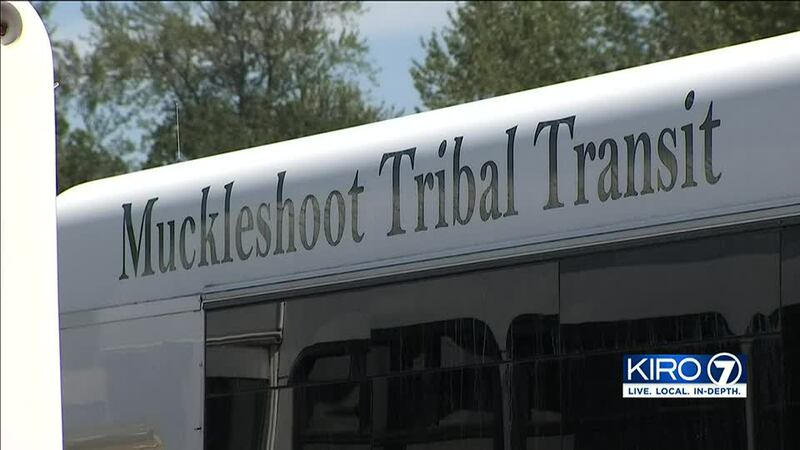KING COUNTY, Wash. — Being able to get where you need to go, whether it’s to the grocery store or work, is something many of us take for granted. But reliable public transit is something the Muckleshoot Indian Tribe didn’t have access to just a few years ago.
“Many community members would be seen walking up and down Highway 164, Auburn-Enumclaw Road,” said Riley Patterson, transportation director for Muckleshoot.
The road is a 55-mile-per-hour highway with no shoulders in some sections. Some people walking have been hit and killed.
“I do know people who were walking up and down the highway who passed on due to traffic incidents,” Patterson said. “So this was a danger to our community,” he said.
That prompted the launch of Muckleshoot Transportation in 2017. The reservation is in an area of Auburn Patterson calls “the rural-suburban cusp” and building a bus service and whole department from scratch to serve the area wasn’t exactly easy. But in just a few short years, buses now run morning and evening, every 30 minutes.
Muckleshoot Transportation has seven buses, which run a 24-mile route from the southern end of the reservation to the Auburn Transit Center. As for the fare, it’s completely free, funded primarily through federal grants.
The side of the bus says “tribal transit” but what a lot of people don’t know is that anyone in the community can get on and get a free ride.
“One of our models is connecting rural Auburn with the entire world,” Patterson said.
Before Muckleshoot Transportation formed, one King County Metro bus that ran once an hour served the area. KIRO 7 asked Patterson for his thoughts on the equity piece, the fact that the tribe had to rely on itself to bring sufficient public transit to the reservation.
Patterson says the history is something they live with, but now the department’s focus is on problem solving and looking forward.
“If we continually approach the issue and remind ourselves over and over again that we are an underserved, marginalized community that has not been treated equitably historically, that will dull the focus on the problems and the solutions - items that we can take action towards,” Patterson said.
The tribe is using that mindset to take advantage of opportunities and now has a brand-new, all-electric bus as part of its fleet.
“Because we are an underserved community historically, that actually opens a lot of opportunities for us - funding, being the primary one,” he said.
Their newest bus is a 12-seater electric bus that comes with a rapid charging station. It was made possible through grants from Puget Sound Energy and a new community project the company is launching.
“It’s a new endeavor for us,” said Mackenzie Martin, PSE’s community project manager. She said part of PSE’s new effort is to increase mobility to underserved communities.
“I think it really takes listening, which is really key for PSE. I think there’s so many ways in which systemic racism shows up in the daily lives of a lot of our communities like tribes, and one of those is definitely access to transportation,” Martin said.
Muckleshoot says you will still see people walking sometimes, especially at night. So they’re doing other things too, like handing out hats with LED lights to help make pedestrians more visible.
Patterson says the number of people walking along the highway is way down. There’s no official data but anecdotally, he believes the number is down about 90%.
Their small team is now working on expanding services, including getting the new electric bus to serve a lunch route, potentially helping supplement King County Metro’s route, and launching a full website to advertise their services.
“I couldn’t be prouder of it to be honest,” Patterson said.
©2021 Cox Media Group








